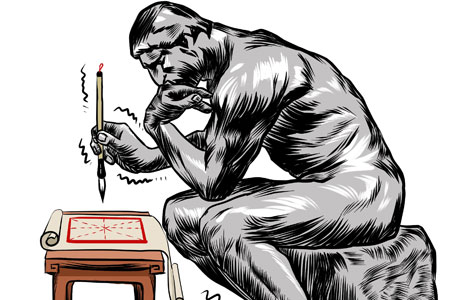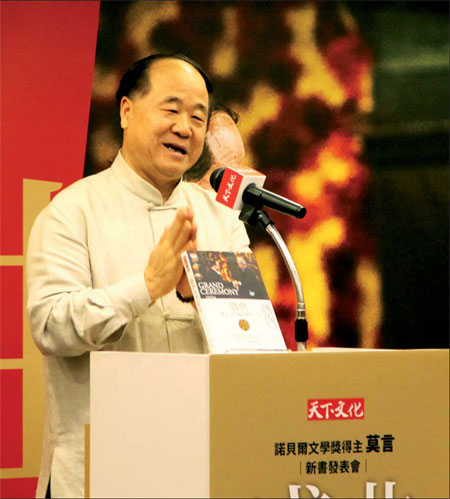Tongue-tied no more
Updated: 2013-10-04 08:57
By Chen Yingqun and Todd Balazovic (China Daily)
|
|||||||||||
With government support for translating books, Chinese authors are finding new audiences
For decades, Chinese authors have had a limited audience, with barriers of language, culture and distance tying them to local readers.
But as China's global stature grows, so too is the desire of readers worldwide to learn more about the country.
"For the past three decades Chinese people have been eager to learn about the world and other cultures, so China has imported a lot of foreign books," says Wang Feng, deputy director of China Book International, a program promoting Chinese publications overseas.
"But as China's economic and cultural strength has grown... Chinese books, one of the most important carriers of Chinese culture, have undoubtedly become more attractive internationally," she says.
The program, set up by the State Council Information Office and General Administration of Press and Publication in 2004, is a major contributor to this success. By funding translation, it aims to encourage foreign publishers to introduce Chinese books to readers worldwide and to promote China's culture overseas.
In 2004, China was the guest of honor at the Paris Book Fair, with funding from the Chinese government, Wang says. "French publishers translated and introduced 70 Chinese titles to French readers, and a third of them were sold at the fair."
The following year, funds from China Book International began to flow to publishers, easing the extensive costs they faced in having works translated.
As domestic and overseas publishers signed copyright deals, the translation funding removed one barrier that had stood in the way of making those deals work.
The program was so successful that applications from publishers for translation funding came flooding in, and a more advanced program, China Masterwork International, was launched in 2009.
"It's obvious that cooperation between Chinese and overseas publishers on translating and introducing Chinese books to international audience has increased greatly in the past few years," Wang says.
Last year about 300 books benefited from the two programs, with funding ranging from 10,000 yuan ($1,630; 1,210 euros) to millions of yuan. In the first half of this year applications for more than 400 books were submitted, only 80 of which were granted funding.
"At the beginning we gave funding for almost anyone who asked for it, as few copyright deals were made. But now we only fund the finest works, which have high-quality content, are written by well-known writers and that are managed by good publishers, to make sure we give money to good books that can showcase China and be influential."
By the end of last year the program managers signed a total of 1,095 deals with 486 publishers from 61 countries, the result being 2,201 Chinese works translated into 38 languages.
China Masterwork International signed 67 agreements with 43 publishers from 17 countries, covering translation and promotion of 763 titles into 10 foreign languages.
Of these books, about half were translated into English, 10 percent into Japanese, and the rest split between mostly European languages, Wang says.

Among the most popular Chinese books in the international market, Beijing Normal University professor Yu Dan's Confucius from the Heart, an interpretation of Confucian wisdom, sold 340,000 copies in 21 languages.
While the amount of copyrighted material subject to deals has increased, subject matter has also changed.
Wang says that at the beginning most titles exported were children's and travel books and works about traditional Chinese culture, such as Confucius, herbal medicine, kung fu and porcelain, but biographies of politicians and works examining development in modern China have become prominent in recent years.
"Books on contemporary themes and Chinese economics, politics and society are becoming more popular. After Mo Yan won the Nobel Prize for literature last year, the world is also becoming more interested in Chinese literature."
Despite numerous improvements, industry insiders say translation remains a barrier for Chinese books in gaining wider recognition.
Frank Zhu, senior business development manager of Greater China at Cambridge University Press, says that with the support of China Masterwork International, Cambridge has taken to Britain 10 translated series that open up cross-cultural communication by bringing key works of Chinese scholarship and top-quality content to the attention of Western readers. These include The History of Chinese Civilization, from Peking University Press, and An Introduction to Higher Mathematics, from Higher Education Press.
"The difficulties of translation have three aspects: translator costs and time," Zhu says. "It is very difficult to find good translators for our projects, and the cost is very high. Also, academic works are usually very hard to translate and are time-consuming."
Kurt Beidler, vice-president of Amazon China, says having works translated has made it easier for people outside China to learn about the country's economic development.
"Learning about a country is just like learning about a person: you need to see their eyes and expressions to learn about their personalities. For a country, you need to learn about its culture, people, history and present to discover what is beneath the surface."
Beidler says Amazon has more than 140,000 Chinese-language books available worldwide, but for non-Chinese speakers it is difficult to learn about the real China.
"Producing good-quality books is important, but translation is as important... but to convey the soul and to help people understand what's beyond the actual words is very difficult. So we should work together to try to find good translators."
Tan Yue, president of China Publishing Group Corp, says it is still difficult for Chinese books to gain readers overseas, and it is important to get close to the market and make adjustments for it.
"To ask overseas readers to accept Chinese books on a large scale takes time, because different countries have different ideologies, cultures, mindsets and languages. What Chinese write and like may not suit the taste of foreign readers. It takes a long process of knowing the markets and making the appropriate adjustments."
Contact the writers at chenyingqun@chinadaily.com.cn and toddbalazovic@chinadaily.com.cn
|
Mo Yan, the 2012 Nobel Literature Prize winner, launches his new book Grand Ceremony at an event in Taipei on Sept 21. Overseas readers are showing more interest in Chinese literature after Mo won the Nobel Prize last year. Provided to China Daily |
(China Daily European Weekly 10/04/2013 page8)
Today's Top News
China, Russia co-work for security in Asia-Pacific: Xi
Animal welfare to be added in training
Talks 'can help Chinese banks' in UK
Robust home sales during holiday
APEC 'should take lead' in FTA talks
Beijing targets polluting cars
China warns US, Japan, Australia over sea issues
US on path to default if Obama won't negotiate
Hot Topics
Lunar probe , China growth forecasts, Emission rules get tougher, China seen through 'colored lens', International board,
Editor's Picks

|

|

|

|

|

|






